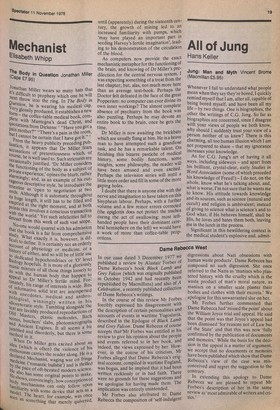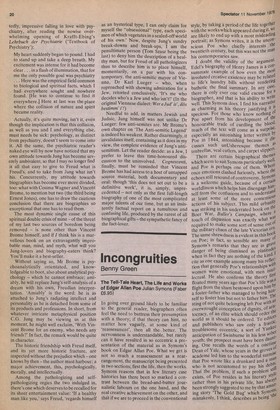All of Jung
Hans Keller
Jung: ilMan £5n79n5d) Myth Vincent Brome m ia Whenever I fail to understand what people mean when they say they're bored, I quickly remind myself that lam, after all, capable of being bored myself, and have been all my life — by two things. One is biographies, the other the writings of C.G. Jung. So far as biographies are concerned, since I disagree with your views of people we both know, why should I suddenly trust your view of a person neither of us knew? There is this charming, all too human illusion which I am not prepared to share — that my ignorance increases your knowledge. As for C.G. Jung's art of having it all ways, including sideways — and apart from his brilliant, crystal-clear, early Studies in Word Association (some of which preceded his knowledge of Freud!) — I do not, on the whole, know what he's talking about, and, what is worse, I'm not sure that he wants me to know. His attitude towards knowledge and its sources, such as science (natural and occult) and religion is ambivalent; instead of giving to science what is science's and to God what, if He behaves himself, shall be His, he loves and hates them both, leaving me in the lurch in the process.
Significant in this bewildering context is the medical student's explosive and, admit tedly, impressive falling in love with psychiatry, after reading the nowise overwhelming opening of Krafft-Ebing's Lehrbuch der Psychiatrie ('Textbook of Psychiatry): My heart suddenly began to pound. I had to stand up and take a deep breath. My excitement was intense for it had become clear . . . in a flash of illumination, that for me the only possible goal was psychiatry . . . Here was the empirical field common to biological and spiritual facts, which I had everywhere sought and nowhere found. [He was to continue to find it everywhere.] Here at last was the place where the collision of nature and spirit became reality.
Actually, it's quite moving, isn't it, even though the implication is that this collision, as well as you and I and everything else, must needs be sick: psychology, as distinct from psychiatry, doesn't seem to come into it. All the same, the psychiatric reader's naked eye will by now have noticed that my own attitude towards Jung has become severely ambivalent, so that I may no longer find it all that easy to give to Freud what is Freud's, and to take from Jung what isn't his. Concurrently, my attitude towards biographies has become ever more divided, too: what with Cosima Wagner and ,Vincent Brome, to mention but two (the third being Ernest Jones), one has to draw the cautious conclusion that there are biographies so exceptional that one has to read them.
The most dynamic single cause of this spiritual double crisis of mine —of the threat of my last two sources of boredom being removed — is none other than Vincent Brome himself, and if I think his is a marvellous book on an extravagantly improbable man, mind, and myth, what will you Jung-lovers and biography-eaters think? You'll make it a best-seller.
Without saying so, Mr Brome is psychoanalytically orientated, and knowledgeable to boot, also about analytical psychology — which he cannot embrace: amiably, he will replace Jung's self-analysis of a dream with his own, Freudian interpretation. 'Amiably' is the word: he is as attached to Jung's radiating intellect and personality as he is detached from some of its products and professions. In short, from whatever intricate metaphysical position C.G. Jung may be viewing us at this moment, he might well exclaim, 'With Vincent Brome for an enemy, who needs any friends?' In fact, the remark would be quite in character.
The historic friendship with Freud itself, and its yet more historic fracture, are inspected without the prejudice which —one knows by then — the author must harbour: a major achievement, this, psychologically, morally, and intellectually.
Among the pathologizing and selfpathologizing orgies the two indulged in, there's one which deserves to be recalled for its sheer entertainment value: 'If a healthy man like you,' says Freud, 'regards himself as an hysterical type, I can only claim for myself the "obsessional" type, each specimen of which vegetates in a sealed-off world of his own.' Now, despite Jung's sundry break-downs and break-ups, I am the penultimate person (Tom Szasz being the last) to deny him the description of a healthy man, but for Freud of all pathologizers thus to describe him is to place himself, momentarily, on a par with his contemporary, the anti-semitic mayor of Vienna, Dr Karl Lueger — who, when reproached with showing admiration for a Jew, retorted conclusively, 'It's me who decides who's a Jew and who isn't!' (In the original Viennese dialect: Wer a Jud' is', dos bestimm' !) Needful to add, in matters Jewish and Judaic, Jung himself was not unlike Dr Lueger: few anti-semites are. Mr Brome's own chapter on 'The Anti-semitic Legend' is indeed his weakest. Rather disarmingly, it invalidates itself, containing as it does in my view, the complete evidence of Jung's antisemitism. Let the reader decide: as a Jew, I prefer to leave this time-honoured discussion to the uninvolved. Cognescenti, finally, must be reminded that Vincent Brome has had access to a host of untapped source material, both documentary and oral: though 'this does not set out to be a definitive work', it is, simply, unprecedented — not only as the first full-length biography of one of the most complicated major talents of our time, but as an insistently factual report on a tumultous and confusing life, produced by the rarest of all biographical gifts — the sympathetic fancy of the fact-lover.



































 Previous page
Previous page